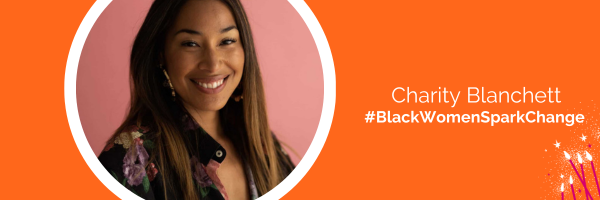
After growing up in Alaska, founding two businesses there, and then living briefly in Hawaii and Los Angeles, Charity Blanchett had an awakening in New Orleans: “To move to a city where it’s predominantly African-American, I felt like, for the first time in my life, I looked like everybody. When I walked out the front door, I thought, ‘Everyone looks like me, everyone’s brown and beautiful. I love it here.’”
Charity, the founder of the Dipping Spoon Foundation, is Black and Indigenous Inuit Yupik. Her mother grew up in a tiny village in Alaska, accessible only by boat or plane. Her father was born in Vallejo, California, grew up in Philadelphia, and then made his way to Alaska after serving in Vietnam. Charity and her five brothers and one sister were raised in the town of Wasilla.
A middle child, Charity was extremely competitive, playing the same sports her brothers did and running for office in school. “I think my acts of service in my life definitely stemmed from being involved in student government from fifth grade all the way up until my senior year of high school.” Her parents are both pastors, and her mother was the first Indigenous Alaskan Native woman to be ordained in the African Methodist Episcopal Zion Church.
Since New Orleans was where she first became determined to make a difference in the culinary world by raising up young Black, Indigenous, and People of Color (BIPOC) women with scholarships and mentorship, that city is where beneficiaries of the foundation’s programs will train and learn.
Improving Cultural and Gender Representation in the Food World
The Dipping Spoon Foundation’s goal is to identify and cultivate the next generation of Indigenous and Black women-Identifying, non-binary, gender non-conforming, and femme culinary youth by providing aspiring chefs with a fully paid culinary scholarship, travel, housing, mental health services, paid externships and mentorship to attend the New Orleans Culinary and Hospitality Institute and shifting culture by creating access to inclusive and dynamic FoodSTEM programs rooted in Food Sovereignty, Food Science and Food Math.
The foundation has been holding fundraisers, including one in early June in Alaska that featured New Orleans-inspired food made with Alaskan ingredients and a screening of a documentary called A Fine Line, which explores the fact that less than 7% of head chefs and restaurant owners are women. Another fundraiser is planned for September in Honolulu, where Charity lives now. The foundation is also accepting applications from 18- to 26-year-olds interested in the program.
The name Dipping Spoon is a translation of Charity’s Yupik name, Qalutaq. “The literal meaning of Dipping Spoon is, you dip into the water, and the water is given to everyone, it grows and keeps growing. So it made sense to me to name the foundation after who I am, certainly in both my Western name, Charity, and my Yupik name, Qalutaq, which is about love and giving and providing.”
Recognizing that students from rural Alaska or Hawaii or other locales might experience culture shock in New Orleans prompted Charity to emphasize access to mental health services as part of the program. “This industry is hard. And there are lots of different types of mental health and substance abuse. So it’s very important to me to not only provide this beautiful scholarship, and housing, but to make sure they have access to mental health and to learn more about self care, and then have access to chef mentors.”
Charity’s vision is that after graduating from culinary school, Dipping Spoon students will head back to the communities where they’re from, to work for one year at a partner restaurant in that community and then choose whatever career suits their goals.
Having grown up exposed to two food cultures, Charity uniquely recognizes the power of honoring a community through food. This became especially evident after she was introduced to the culinary industry and charitable events within it by a former partner who owned a restaurant. “I realized that what I was seeing and experiencing was people celebrating their identity, their culture, through food. And food has been inherently at the forefront of who I am. As an indigenous woman, I grew up eating traditional native food through my mother’s side. And then also in growing up in black church, it was a three-hours-long service on Sunday, then afterwards you’d have potluck style black-eyed peas, ham hock, and cornbread and things.”
Rely on Your Network and Your Mentors
Charity credits her student government advisor in high school, Miss Judy Bredberg, for helping her tap into her “unique magic.” Miss Bredberg encouraged Charity’s interest in running for Executive Board when she was just a freshman, saying “Just do it.”
“What I would tell the next generation of change makers, young women out there, is definitely lean into your network, but really lean into your mentors,” Charity says. “Because they’re there to help you and they want to see you succeed. And also, if you have an idea, you want to help your community, someone down the street, whatever, just do it. What do you have to lose?”
